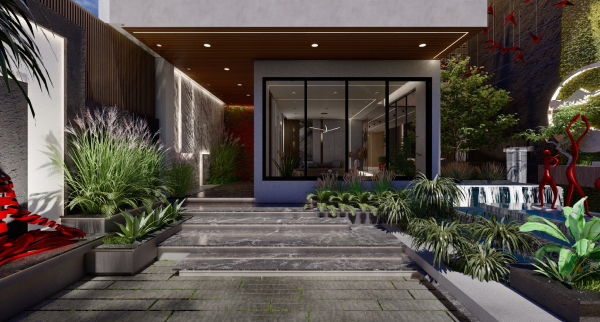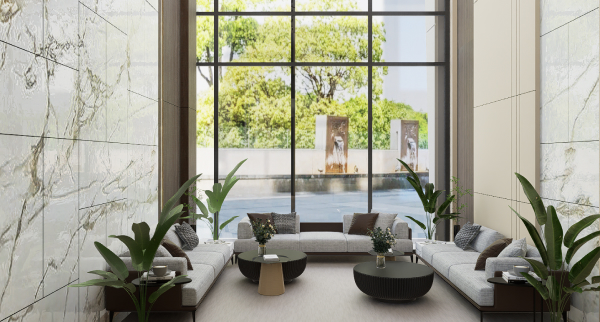We recently had the opportunity to interview Ar. Piyush Mayal, the founder of Rhythm and Emphasis, in our Hydroarch feature. Piyush is known to have minimal but strong designs that combine functionality, natural materialism, and an element of serene style in all his ventures.
To him, design can not be excessive. It is all about taking things back to the basics, thus making spaces beautiful and useful.
The Courtyard Philosophy
One thing you find very frequently, when you consider the body of work by Piyush, is the courtyard. It is not only an architectural element to him but an individual relation as well.
In Rajasthan, where architecture is heavily affected by the Rajput and Mughal traditions, he was exposed to havelis, forts and palaces with courtyards in the middle. These are spaces that were not decorative but defined community life, offered some breath, and fresh air and some break in the routine lives.
Although urban homes today are subject to the issue of space, Piyush can still manage to incorporate courtyards and can even locate them in the east or north direction to enable natural ventilation and lighting. He does not think that courtyards are all about living, but about experiencing the home.
Designing With Clients, Not Just For Them
In the case of Piyush, design is a fun process since it is a participatory activity. In his opinion, it is only when the client is engaged in the project that it can be considered to be really effective, when the expectations, lifestyle, and desires of the client form the blueprint.
He looks back at the way architecture has evolved over the past decade.
When it comes to architecture, ten years ago it was considered a luxury. Now it is all about functionality and sustainability, and luxury is an added dimension.
It is this change, he says, that has led him to make training clients on environmentally friendly practices a significant part of his practice. The concept of sustainability can be enormous, yet it is his responsibility to make clients acquainted with the fundamentals and push them towards more eco-friendly lifestyles.
Motilal Villa, Nizamabad: A Case Study

One project that Piyush holds close is the Motilal Villa in Nizamabad, a home spread across 670 sq yards. At its heart lies a lush central courtyard, surrounded by spaces designed with passive cooling principles.
The villa integrates:
- Solar panels for renewable energy
- Smart water management systems
- Cross-ventilation for natural airflow
- Water-saving techniques to reduce consumption
Every room is designed to maximise natural light and ventilation, ensuring the villa sustains itself efficiently. For Piyush, this wasn’t just about scale — it was about showing how large homes too can be sustainable and biophilic, drawing residents closer to nature while feeling deeply aesthetic.
Biophilia at the Core

Another project that highlights his design values is a clubhouse integrated with a biophilic garden. Here, the boundaries between indoor and outdoor blur, creating a seamless connection between people and nature. Using locally sourced materials, the design ensures sustainability while staying true to his minimalist philosophy.
The Story of Material Choices.
The only thing that distinguishes the work of Piyush is his material palette. He favours earthly, natural materials – limestone being one of them. Limestone is known to be durable, workable and everlasting and its usage can be traced in walls, cladding, floors and even decorations.
To him these materials are not elements of construction – they are storytellers. Softly modeled, they make the sincerity of architecture to surface even as they maintain its roots and warmth.
Closing Thoughts
Through his projects,Ar. Piyush Mayal demonstrates that there is no need of architecture being loud to be powerful. His work with the use of natural material, biophilic design, and sustainability by incorporating courtyards helps create minimal but meaningful spaces, which relate to life itself.
At Hydroarch, we are inspired by how architects such as Piyush are redefining design, not as a practice, but as a way of life and living with nature.


